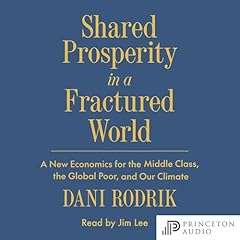
Trade Wars Are Class Wars
How Rising Inequality Distorts the Global Economy and Threatens International Peace
No se pudo agregar al carrito
Add to Cart failed.
Error al Agregar a Lista de Deseos.
Error al eliminar de la lista de deseos.
Error al añadir a tu biblioteca
Error al seguir el podcast
Error al dejar de seguir el podcast
 Exclusivo para miembros Prime: ¿Nuevo en Audible? Obtén 2 audiolibros gratis con tu prueba.
Exclusivo para miembros Prime: ¿Nuevo en Audible? Obtén 2 audiolibros gratis con tu prueba.Compra ahora por $19.10
-
Narrado por:
-
Bob Souer
A provocative look at how today's trade conflicts are caused by governments promoting the interests of elites at the expense of workers.
Trade disputes are usually understood as conflicts between countries with competing national interests, but as Matthew C. Klein and Michael Pettis show in this book, they are often the unexpected result of domestic political choices to serve the interests of the rich at the expense of workers and ordinary retirees.
Klein and Pettis trace the origins of today's trade wars to decisions made by politicians and business leaders in China, Europe, and the United States over the past 30 years. Across the world, the rich have prospered while workers can no longer afford to buy what they produce, have lost their jobs, or have been forced into higher levels of debt.
In this thought-provoking challenge to mainstream views, the authors provide a cohesive narrative that shows how the class wars of rising inequality are a threat to the global economy and international peace-and what we can do about it.
©2020 Matthew C. Klein and Michael Pettis (P)2020 TantorLos oyentes también disfrutaron:




















Las personas que vieron esto también vieron:


















well worth it but a difficult read
Se ha producido un error. Vuelve a intentarlo dentro de unos minutos.
The only complaint I have is the narrator's breathing. In an earbud it can get annoying.
Insightful and Knowledgeable
Se ha producido un error. Vuelve a intentarlo dentro de unos minutos.
Solid data leads to understanding
Se ha producido un error. Vuelve a intentarlo dentro de unos minutos.
The best - explaining how different economies managed development. Like the Early United States. Gives an excellent and intelligent explanation of the modern Japanese malaise. Even things like early 19th century banking and international finance.
Eurozone chapter, amazing. The explanation of tax haven mechanics, the best I have read, anywhere. Also, the chapter on trade and logistics optimization is great. I learned a great deal. This book is so good, It should cost 2 Credits.
When a book is this good, 5 stars is not enough.
An excellent account of Trade and Economics
Se ha producido un error. Vuelve a intentarlo dentro de unos minutos.
Interesting prospective on global trade
Se ha producido un error. Vuelve a intentarlo dentro de unos minutos.


